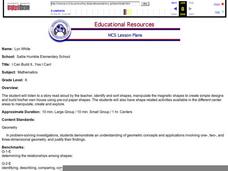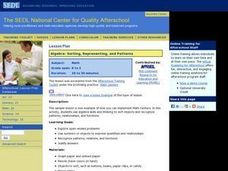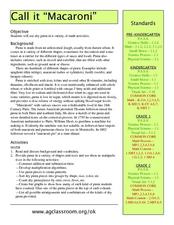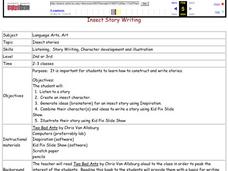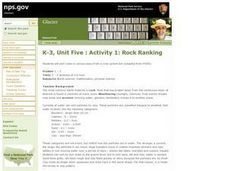DiscoverE
Sorting Solutions
It's okay to play with your food—just this once! Scholars design and create meshes and chutes to sort pasta by size and shape. They test their designs and make improvements as necessary.
Math Solutions
Shape Sorting: Looking for Green!
Young mathematicians rotate, flip, and sort their way to an understanding of the different attributes of geometric figures. Using transparent yellow and blue shapes, children try to match congruent figures together...
Curated OER
Sorting Things Out
Written to examine seeds that grow in Kansas, you can adapt this lesson plan to anywhere you live. Learners sort a mixture of five different seeds to by any characteristic of their choice. When your budding scientists are exploring the...
Curated OER
Sorting and Classifying Concrete Objects by Varying Attributes
First graders examine how to sort concrete objects by their attributes. In this sorting lesson, 1st graders listen to Gray Rabbit's Odd One Out by Alan Baker, and discuss the actions of the main character. They practice sorting objects...
Curated OER
I Can Build It.....Yes I Can!
Kindergartners listen to a story read by their teacher, then use magnetic shape pieces to construct simple designes. They "build" their own house using pre-cut paper shapes. This age-appropriate lesson would be an excellent choice for...
Curated OER
Shapes
Students sort objects by shape, size and color. In this math and literacy sorting lesson, students listen to the book Freddy the Fish and the Squash that Goes Squish by Duke Christoffersen. Students work in small groups to sort vegetable...
Curated OER
Gummy Bear Sorting
Students demonstrate knowledge of sorting and classifying by color as they sort gummy bear candies.
Curated OER
Investigation: Sorting and Classifying
Fifth graders explore geometry by creating shapes with construction paper. In this shape characteristics instructional activity, 5th graders identify the different attributes that make up specific shapes and create them using...
Curated OER
Algebra: Sorting, Representing, and Patterns
Students sort objects and create patterns. In this sorting and graphing lesson plan, students work at centers to find a way to sort a group of objects, then make a graphical representation of the number of each item. Finally, students...
Curated OER
An Introduction to Acids and Bases
Students explore acids and bases. In this lesson about acids and bases, students do an experiment to test certain items to determine what they are. Students use cabbage and litmus paper as indicators. Students understand how to sort the...
Curated OER
Fun Activities Using Seeds
Learners analyze the size, shape, and form of several different seeds. In this all about seeds lesson plan, students complete four activities involving characteristics of seeds. Learners observe the seeds, record information about the...
Curated OER
Falling Into Geometry Through Paper Art
Students explore geometric shapes. In this kindergarten geometry lesson, students create a fall quilt consisting of three different paper geometric quilt squares that when assembled form a scarecrow, a pumpkin, and a crow. ...
Curated OER
Call it "Macaroni"
Who knew there were so many fun educational opportunities featuring pasta? Scholars read a brief informational text about the history of pasta (note that "macaroni" is spelled two different ways, so address this if kids are reading...
Curated OER
Seed Sorting
Young scholars examine and sort seeds. For this life science lesson, students make general observations of a tub of seeds, then develop sorting criteria for sorting the deeds. Lesson includes extension activities.
Curated OER
What Is in a Rock?
Students identify, sort, and classify mineral samples that make up a common rock.
Curated OER
The Grouchy Ladybug
Students learn about sorting and classifying objects by size while reading Eric Carle's "The Grouchy Ladybug". In this sorting and classifying lesson, students first listen to and interact with the story. They then look at cut-outs of...
Curated OER
Exploring Rocks
Students recognize differences in the size, shape, texture, and color of different rocks. For this rocks lesson plan, students also learn and repeat back how a volcano erupts and make one out of a toilet paper tube.
Curated OER
Math: Odd Object Out
Students discover how to classify and categorize items by sorting various objects. As they sort the items, they explain how the items are alike. By repeating the sorting procedure several times, students determine there are numerous...
Curated OER
HOW FAST DO SEDIMENT GRAINS OF DIFFERENT SIZES SETTLE?
Students conduct an experiment using sand, a jar, and a paper clip to analyze the effects of different kinds of sand vis a vis its sediment. They graph their findings and analyze for factors of size, shape, and density.
Curated OER
How Does Flowing Water Shape a Planet's Surface?
Students investigate how flowing water influence landforms. In this earth science lesson, students observe water behavior as it flows from the stream table at various inclinations. They discuss whether water shaped Mars landforms or not.
National Park Service
Rock Ranking
Junior geologists sort rocks and soil. They separate a sample of river gravel by size, shape, color, and other characteristics. To include Common Core standards, you could have little ones graph the number of particles in each sample.
Curated OER
Rocks and Minerals
Fifth graders examine different types of rocks and classify rocks by their different characteristics. In small groups they sort their rocks into two categories, then create three categories to sort by on a sorting worksheet. Next, they...
Curated OER
Making a Rock Collection, Lesson 1
Students discover the different shapes and sizes of rocks. They create a chart on what they already know about rocks and sort rocks by size. They place cutouts of rocks on construction paper from smallest to largest.
Curated OER
Seeds in Fall...Collect Them All!
Classify seeds by attributes such as size, shape and color! Learners classify seeds using a dichotomous key. They identify human behaviors that have a positive impact on preserving seed and plant biodiversity.




